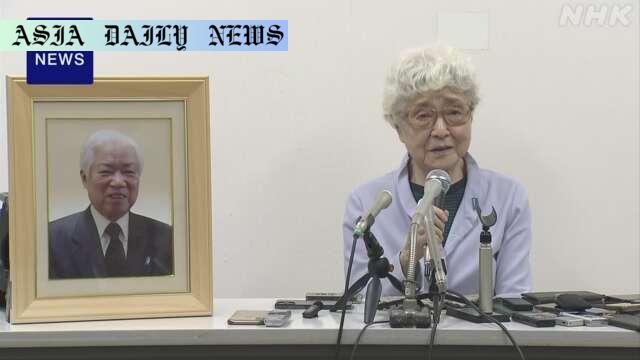Abductees – The 89-year-old mother of Yokota Megumi, a victim of abduction by North Korea, appeals to the government for immediate action.

Introduction: A Lifelong Struggle
The subject of North Korean abduction cases has long been a contentious issue for Japan. One poignant story from this lingering tragedy comes from Yokota Sakie, the 89-year-old mother of Yokota Megumi, who was abducted as a first-year junior high school student in 1977. Over the years, the Yokota family has become a symbol of perseverance, fighting tirelessly for the return of Japanese citizens abducted by North Korea during the 1970s and 1980s. While some victims have found their way back home, others, like Megumi and her family, remain stuck in a painful limbo of uncertainty.
A Mother’s Public Plea
On Tuesday, just days before the fifth anniversary of her husband Yokota Shigeru’s death, Yokota Sakie made an emotional appeal to Japan’s government. In her plea, she pressed leaders to work more seriously and commit to resolving these longstanding abduction cases. Her frustration stems from witnessing countless government changes and hearing repeated promises, yet seeing no true progress in almost 50 years since her daughter was taken.
Her husband, Shigeru, led the foundation that represented and advocated for the abductees’ families for over a decade. Unfortunately, many parents of abductees have passed without seeing the resolution of their cases. As the last surviving parent of government-recognized abductees, Yokota Sakie feels an even greater urgency for action, knowing time is running out for families who hold onto dwindling hope.
The History of Abductions and Government Response
North Korea has admitted to abducting citizens of Japan in the late 20th century to train spies in Japanese language and culture. As of now, Japan recognizes 17 of its citizens as abductees, though advocates and families claim the actual number might be higher. In 2002, five abductees were allowed to return to Japan following a bilateral summit, but the fate of the remaining twelve remains unknown.
The Japanese government has publicly vowed to bring the abductees back home, including mentioning it as a high diplomatic priority. However, families of the victims claim that tangible negotiation efforts have fallen short. The issue is compounded by strained diplomatic relations between Japan and North Korea, making direct dialogue increasingly challenging. Yokota Sakie’s appeal highlights the gap between government promises and real outcomes, and the emotional toll on affected families.
The Painful Wait and Call for Responsibility
For almost five decades, family members of abductees have lived in a state of uncertainty, hope, and despair—a mix of emotions exacerbated by passing time. Every year, political leaders express their condolences and determination to act, but their words have not translated into meaningful progress. Families have grown older; many have died, leaving siblings or other relatives to continue the fight. As the last surviving parent of the recognized abductees, Yokota Sakie’s voice carries significant weight.
Her plea is rooted not only in a mother’s undying love but also in her obligation to preserve the memory of her daughter’s abduction and keep the public and government engaged. Her statement, “Time is running out,” underlines the urgency of resolving this humanitarian issue before it is too late.
Broader Implications of the Abduction Issue
The unresolved saga of Japanese abductees goes beyond individual tragedies. It represents a lingering wound in Japan’s national psyche and complicates its foreign policy. Rescuing the abductees would not only bring relief to their long-suffering families but also reaffirm Japan’s commitment to protecting its citizens. Moreover, it would likely set a precedent for handling future cases of cross-border abductions and signal to the international community that such acts will not be tolerated.
Diplomatic experts argue that addressing these cases requires international collaboration, as North Korea’s isolation and limited willingness to cooperate hinder unilateral efforts. Human rights organizations advocating on behalf of abductees stress that awareness and pressure from the global community are needed to initiate meaningful action.
Commentary
The Human Cost of Inaction
The plea by Yokota Sakie is a reminder of the devastating human cost of inaction. Her strength and determination after nearly 50 years of agony are both commendable and heartbreaking. It is astonishing how the pain and despair of these families, decades long, have failed to galvanize a resolute and effective plan of action. Yokota Megumi, taken as a bright young student, missed so much of her life—her family, her aspirations, and her own journey. This tragedy isn’t just about one girl; it is a story repeated for multiple families. The world must ask itself why such cases continue to be unresolved.
A Call for Diplomatic Commitment
Japan’s government must elevate this issue in its diplomatic agenda, not merely as rhetoric for political events but as an urgent humanitarian cause. Public pressure, international intervention, and broader alliances could be crucial in creating pathways for dialogue with North Korea. However, such efforts require commitment and persistence from all parties involved, something that has been lacking thus far. This prolonged inaction by the government has not only failed families like the Yokotas but has also set a dangerous precedent for tolerating international rights violations.
Global Solidarity and Awareness
Stories like that of the Yokota family should resonate globally. Abductions are not just an isolated issue for Japan—they reflect the vulnerabilities of ordinary citizens caught in the crossfire of global politics. Raising awareness on international platforms would not only honor the memory of those abducted but also set a foundation for one global voice against such injustices. Leadership, at its core, is about protecting all lives, particularly the vulnerable. As the world watches, the question remains: Will action finally replace indifference?


